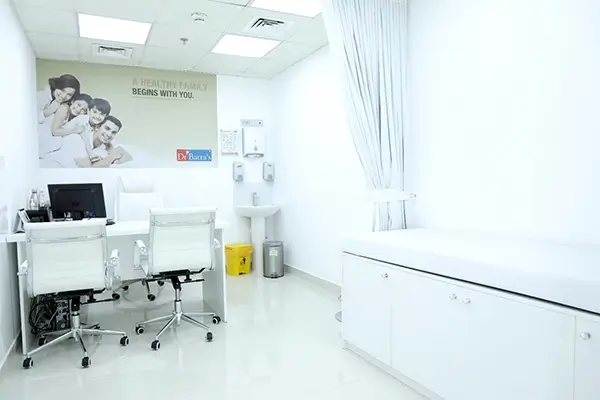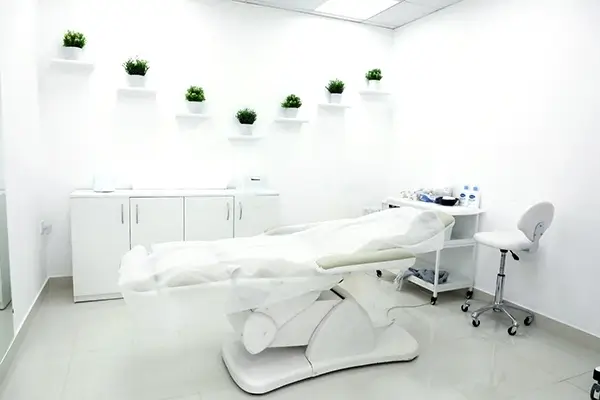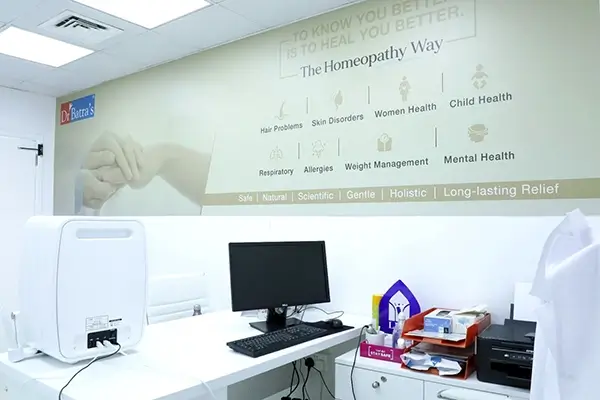PCOS / PCOD Treatment in Dubai, UAE
Polycystic Ovary Syndrome (PCOS), also known as Polycystic Ovary Disease (PCOD), is a significant health concern among women in the UAE, with studies revealing that approximately 25.9% of Emirati women aged 25 and above are affected by the condition (source).
Furthermore, research conducted at Latifa Hospital in Dubai between 2017 and 2022 highlighted that 1.6% of women aged 15–45 years were diagnosed with PCOS, with the annual point prevalence increasing from 1.19% in 2020 to 2.72% in 2022, pointing to a growing trend in diagnoses (source).
These statistics underscore the rising impact of PCOS in the UAE, emphasizing the importance of early diagnosis and tailored treatment options to address the hormonal imbalances and symptoms associated with this condition.
PCOS can have a profound impact on a woman's quality of life, leading to symptoms such as irregular menstrual cycles, weight gain, acne, hair thinning, and infertility. In the fast-paced environment of Dubai and the broader UAE, managing PCOS requires an approach that is both effective and aligned with the natural lifestyle of the region.
Dr Batra's® Homeopathy Clinics in Dubai and Abu Dhabi provide an innovative and natural solution to PCOS treatment, offering safe, side-effect-free remedies to help manage and alleviate symptoms.
Why Choose Dr Batra's® PCOS Homeopathy Treatment in Dubai?
1. Global Trust and Expertise
Dr Batra's® is a globally recognized name in homeopathy, trusted by thousands of patients worldwide. With over four decades of expertise, we have successfully treated more than 2 million patients globally. Our specialized PCOS treatment has helped thousands of women in the UAE manage their condition effectively and naturally.
Homeopathy offers a personalized, patient-centric approach, focusing on not just symptom management but also addressing the underlying causes of PCOS.
2. Expert Care
Our team of highly skilled homeopaths is committed to providing expert care. We understand that PCOS is a complex condition with various manifestations, and our experienced practitioners take the time to assess each patient's unique health profile.
Our approach involves understanding the root cause of your PCOS and crafting a treatment plan that is both holistic and personalized.
3. Customized Treatment Plans
At Dr Batra's®, we don't believe in a one-size-fits-all approach. Our homeopathic treatments for PCOS are tailored specifically to each patient's needs, addressing hormonal imbalances, weight management issues, and other associated symptoms.
Each treatment plan is designed after a thorough consultation, which includes an analysis of your health history, lifestyle, and specific concerns.
4. Proven Results
Dr Batra's® PCOS homeopathy treatment has yielded proven results, with many of our patients reporting significant improvements in their symptoms.
We have seen a remarkable success rate in managing irregular menstrual cycles, reducing hirsutism (excessive hair growth), and improving fertility. Our patients' testimonials and case studies serve as a testament to the effectiveness of our holistic approach.
5. Convenient Locations
Dr Batra's® clinics are conveniently located across Dubai and Abu Dhabi, making it easy for patients to access treatment. Our locations include
Get PCOS/PCOD Treatment at Conveniently Located Clinics in Dubai & Abu Dhabi





Our Treatment Process for PCOS at Dr Batra's® Clinics in UAE
1. Personalized Consultation
Our treatment process begins with a thorough consultation to understand your symptoms, medical history, and lifestyle. This holistic assessment enables us to create a treatment plan that aligns with your unique health needs. We understand that every case of PCOS is different, and we tailor our approach accordingly.
2. Advanced Homeopathic Treatment
Homeopathy works by stimulating the body's natural healing processes. After your consultation, our expert homeopaths recommend a personalized homeopathic remedy.
These remedies are safe, non-toxic, and target the root cause of PCOS, such as hormonal imbalances, insulin resistance, and stress-related issues. Our remedies are tailored to your individual symptoms and health profile.
3. Holistic Approach
Our treatment does not focus solely on medication. We offer holistic guidance, including lifestyle changes, dietary recommendations, and stress management techniques that complement the homeopathic remedies. This ensures that you achieve long-term results and improve your overall well-being.
4. Proven Results
We monitor your progress closely throughout your treatment journey. Follow-up consultations allow us to track your symptoms, review test results (if applicable), and make necessary adjustments to the treatment plan. Many of our patients report a significant improvement in their symptoms after just a few months of treatment.
Symptoms of PCOS
PCOS presents a range of symptoms, which can vary from woman to woman. Here are the most common signs to look out for:
- Irregular Menstrual Cycles: Many women with PCOS experience infrequent, irregular, or prolonged periods. This is due to hormonal imbalances that affect ovulation.
- Weight Gain and Difficulty Losing Weight: Insulin resistance is a common issue for women with PCOS, leading to weight gain and difficulty losing weight. This can exacerbate other symptoms of PCOS.
- Excess Facial and Body Hair (Hirsutism): Increased levels of androgens (male hormones) in women with PCOS can lead to excessive hair growth on the face, chest, and back.
- Acne and Oily Skin: Elevated androgen levels can also cause oily skin and acne, which can affect both the face and the body.
- Hair Thinning or Hair Loss: Thinning of the hair on the scalp is another common symptom, contributing to reduced self-esteem and confidence.
- Infertility or Difficulty Conceiving: Irregular ovulation often leads to difficulty in conceiving. Many women with PCOS struggle with fertility issues, but with proper treatment, fertility can be enhanced.
- Causes and Risk Factors: The exact cause of PCOS is still not fully understood, but there are several contributing factors:
- Hormonal Imbalances: Women with PCOS typically have elevated levels of androgens (male hormones), which disrupt ovulation and cause many of the associated symptoms, including acne, hirsutism, and hair thinning. Additionally, insulin resistance can lead to higher insulin levels, which further exacerbates the condition.
- Genetic Predisposition: PCOS tends to run in families, and women with a family history of the condition are at a higher risk of developing it.
- Lifestyle Factors: Poor dietary habits, lack of physical activity, and obesity can all contribute to the development and worsening of PCOS. These factors often exacerbate insulin resistance and hormonal imbalances.
- Stress and Environmental Factors: Chronic stress can significantly impact hormonal health, contributing to the development of PCOS. Stress management is a crucial part of treating the condition effectively.
Complications
Women suffering from PCOS have higher chances of infertility, miscarriage, gestational diabetes, pregnancy-induced high blood pressure (preeclampsia) and premature delivery.
Babies born to women with PCOS have an increased risk of being admitted in a neonatal intensive care unit or dying before, during, or shortly after birth. Women with PCOS have a higher risk of developing multiple serious disorders, including life-threatening diseases.
Some of the medical conditions that PCOS may lead to are:
- Type 2 diabetes - a lifelong condition that causes the blood sugar level to become extremely high
- Depression and mood swings - because the symptoms of PCOS can affect your confidence and self-esteem
- High blood pressure and high cholesterol - which can lead to heart diseases and stroke
- Sleep apnoea - overweight women may also develop sleep apnoea, a condition that causes interrupted breathing during sleep
- Women with absent or very irregular periods (fewer than three or four periods a year) due to PCOS for many years have a higher-than-average risk of developing cancer of the womb lining (endometrial cancer).
PCOS - Causes
The primary reason for PCOS is hormonal imbalance. In women with PCOS, the ovaries make more androgens (male hormones) than normal. High levels of these hormones affect the development and release of eggs during ovulation.
PCOS is also associated with insulin, a hormone that allows your body to use sugar (glucose) from carbohydrates in your food. It uses this glucose for energy or stores it for future use.
Many women with PCOS have too much insulin in their bodies because they have problems using it. Excessive insulin appears to increase the production of androgen, which interferes with the development of follicles and prevents normal ovulation. High androgen levels can lead to:
- Acne
- Excessive hair growth
- Weight gain
- Problems with ovulation
Other affected hormones include testosterone - it is secreted in small amounts in women as compared to men - and luteinizing hormone (LH) – which stimulates ovulation. However, this may have an abnormal effect on the ovaries if their levels are too high. In some women, this hormonal imbalance further elevates levels of prolactin - a hormone that stimulates the breast glands to produce milk during pregnancy.
Genetics may also be one of the contributing factors, which may increase the chances of developing this condition, although the exact link and specific genes associated with it are not yet established.
PCOS - Diagnosis
Though symptoms like irregular menstrual period, pelvic pain, hair loss, unwanted hair on face & body, sudden weight gain and acne are some of the evident symptoms of PCOS, to confirm the diagnosis and rule out other conditions that might have caused the symptoms, our doctors will talk to you about your family's medical history, including whether your mother or sister has PCOS or problems getting pregnant. This information is helpful, as PCOS tends to run in families. He may suggest some tests like:
Pelvic exam: Our female doctor will look at and feel the areas of your body including the vagina, cervix, uterus, fallopian tubes, ovaries, and rectum, checking for anything unusual and then suggest a pelvic ultrasound.
Pelvic ultrasound (sonogram): An ultrasound of your pelvic region produces an image of what your ovaries look like. The doctor will check for cysts in your ovaries and how thick the lining is in your uterus. That lining appears thicker than normal if your periods are delayed and irregular.
Your ovaries may be 1½ to 3 times larger than normal when you have PCOS. The ultrasound can show ovary changes in about 90 percent of women who have PCOS.
Blood tests: Blood tests are done to measure hormonal levels (androgens) in your body. It may also be done to assess the levels of other reproductive hormones that may affect your menstruation. Our doctors may also test your cholesterol and insulin levels.
Why Choose Homeopathy for PCOS Treatment?
Homeopathy offers a natural, side-effect-free approach to treating PCOS. Unlike conventional treatments that often focus solely on managing symptoms, homeopathy addresses the root causes of the condition, restoring hormonal balance and improving overall health.
Homeopathic remedies can help regulate menstrual cycles, enhance fertility, and manage symptoms like weight gain and excessive hair growth, all without the side effects associated with traditional medication.
- Natural and Side-Effect-Free Approach Homeopathic remedies are prepared from natural substances, ensuring they are gentle on the body and free from harmful side effects. They work by stimulating the body's healing mechanisms.
- Treats the Root Cause Rather than masking symptoms, homeopathy works to address the underlying hormonal imbalances and insulin resistance that contribute to PCOS. This holistic approach ensures that patients experience long-term relief and improved health outcomes.
Improves Hormonal Balance and Menstrual Cycle Regulation
Homeopathy helps in regulating menstrual cycles and balancing hormone levels, restoring natural ovulation and improving overall reproductive health.
- Enhances Fertility Naturally: By restoring hormonal balance and regulating the menstrual cycle, homeopathy can help improve fertility and increase the chances of conception.
- Addresses Associated Concerns: In addition to treating the core symptoms of PCOS, homeopathy can help manage associated issues like weight gain, acne, and hair loss, improving overall health and well-being.
- Diet and Lifestyle Recommendations for PCOS: While homeopathy plays a crucial role in managing PCOS, lifestyle modifications can significantly enhance the treatment results.
- Balanced Diet: Eating a balanced diet is key to managing insulin resistance. Focus on low-glycemic index foods, high fiber, and lean proteins to stabilize blood sugar levels.
- Regular Physical Activity: Exercise helps improve insulin sensitivity and promotes weight management, both of which are crucial in managing PCOS.
- Stress Management: Yoga, meditation, and other stress management techniques can help regulate hormonal levels and reduce the impact of stress on PCOS symptoms.
- Sleep Hygiene: Adequate sleep is vital for hormonal balance. Aim for 7-9 hours of quality sleep each night to support overall health.
PCOS and Fertility: How Homeopathy Helps
Homeopathy can be particularly beneficial for women with PCOS who are struggling with fertility.
By addressing the root causes of hormonal imbalances and regulating ovulation, homeopathy can improve reproductive health and increase the chances of conception.
Many of our patients have reported success in conceiving naturally after undergoing homeopathic treatment.
Book a Consultation
At Dr Batra's®, we make it easy to get started with treatment. Our clinics in Dubai and Abu Dhabi are ready to assist you in your journey toward better health.
Book your consultation today and take the first step toward managing your PCOS with natural, effective homeopathic remedies.
For more information or to schedule your appointment, visit our website or call our clinic directly. We look forward to helping you regain control over your health.
FAQs
Is PCOS a gynecological or an endocrinological disorder?
Since many of the symptoms involve a woman’s reproductive system, PCOS is often mistaken for a gynecological disorder. It is, however, a disorder of the endocrine system involving hormones and hormone production. Therefore, a specialist in the endocrine system, such as a reproductive endocrinologist, should be consulted to confirm the diagnosis.
How is PCOS diagnosed?
Diagnosis requires obtaining blood samples for a variety of hormones. A full physical examination and screening for cholesterol, triglyceride, glucose, and insulin should also be part of a complete evaluation. USG of the lower abdomen and pelvis also helps to detect PCOS.
Is there a treatment for PCOS?
Yes. At present, doctors can only treat the individual symptoms of women with PCOS, rather than the entire syndrome. Once diagnosed, most patients can effectively manage their symptoms to help lead healthier and more satisfying lives. Dietary changes with lifestyle modifications can help a lot.
What effect can weight loss have on women with PCOS?
Weight loss alone often regulates the menstrual cycle and even a small loss of 4-6 kgs can be helpful in making the menstrual cycle more regular. Weight loss has also been found to improve cholesterol and insulin levels, and relieve symptoms such as excess hair growth and acne too.
What can be done to increase the chances of pregnancy for women with PCOS?
Successful ovulation is the first step towards pregnancy. Weight loss often helps to regulate the menstrual cycle, thereby leading to successful ovulation. This, along with dietary-rich vitamins and anti-oxidant supplements, can increase the chances of pregnancy for women with PCOS.
Why is public awareness of PCOS so critical?
The symptoms of PCOS can vary from one woman to another; therefore, a woman does not often realize she has it. Public information and awareness about the symptoms and serious nature of the condition are crucial to identify women in need of treatment and for women to make informed decisions about their health.




